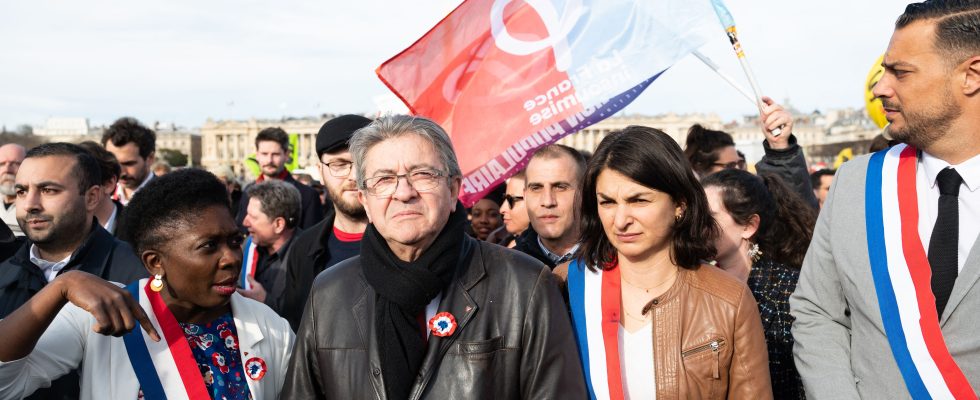Floating in the air a wind of May 1968. In the streets of Paris, already. Since the government unsheathed 49.3, the protests against the pension reform have taken another, more violent turn. In the fields of Sainte-Soline (Deux-Sèvres) where we saw clashes of rare intensity between anti-basin demonstrators and the police, injuring 47 gendarmes and 200 opponents , two of whom are still in a coma at the time of writing.
And of all this, the left, the news, that led by Jean-Luc Mélenchon, found nothing to complain about, or almost. “Overflows can happen. Compared to May 1968, what is happening today is still very nice. But I repeat: I do not encourage violent actions, on both sides”, temporized the rebellious leader. A “yes but” to which the left had no longer accustomed us, and which suits in every way the strategy of the former presidential candidate: to transform an angry people into a revolution. A strategy he voluntarily borrows from Hugo Chavez, the Venezuelan “comandante”. In an interview at wind risesan information site classified on the left, he assures: “It is no longer a question of building a revolutionary vanguard but of making a rebellious people a revolutionary people. The strategy of conflictuality is the means of this orientation. […]. The construction of a people of revolutionaries is not a gala dinner.
“I absolutely disagree with violence”
You should always read Jean-Luc Mélenchon because sometimes you don’t know which Mélenchon is talking about. The apostle of Chavez or the connoisseur of French politics and its history? In a long and fascinating interview with the magazine of the two worlds, in October 2022, he castigates violence, even revolutionary, as it inevitably leads to the violence of power and “counter-revolutionary waves of repression”. “I absolutely disagree with so-called revolutionary violence because it stunts the revolutionary process. I also know that a revolution that begins with violence continues in violence. The progress of civilization, on the contrary, requires courage, method and political discipline”, he insists.
But in 2023, the political time is no longer the same. The short term prevailed over the construction, all the more so when a massive social movement, made up of workers, students, high school students and peaceful demonstrators, and others who came to do battle with the police, joins in the landscape, with support in public opinion, four years from a most open presidential election. Neither Jean-Luc Mélenchon, nor the socialists and environmentalists, who support him, want to miss the boat. And what does the violence matter? Hadn’t these left-wing parties already missed the moment of the yellow vests?
In November 2018, Mélenchon doubted. He does not call for mobilization with the yellow vests, gives reason to the rebellious who want to walk alongside them and also accepts those who refuse it because the far right would have infused the movement. Then the movement gains momentum, spreads in public opinion which supports the Yellow Vests for long weeks. A “Chavez” moment, then believes Mélenchon, who changes the disc: he curries “the blindness of the traditional world of the left” too spinner with the movement, and congratulates a movement which “resembles nothing of what one has seen to this day” and illustrates “a transition of times”. The revolution in the ballot box will never take place and the rebellious will never take advantage of a social crisis.
Cultural victory, political failure
Floating in the air a wind of May 1968. As 55 years ago, the country has the head on the left. Blame it on the purchasing power crisis, inflation, deindustrialization, etc. Even the Republicans are divided on the sacrosanct pension reform, who would have believed it? But if the cultural battle seems won, it remains to the left Nupes the long quiet river of the political battle. And the Nupes is far from winning the bet, as evidenced by the last Ifop / Fiducial poll of March 26. It is not the left-wing parties that emerge strengthened from this sequence, but the National Rally. In the event of early legislative elections, Marine Le Pen’s party would win 26% of the vote, i.e. 7 points more than in the June 2022 legislative elections. The left, for its part, stagnates around 26%, despite all the energy put into the mobilization against the pension reform.
Comparison is not right, but floats in the air a wind of May 1968, or rather of June 1968. If the demonstrations led to a cultural victory for the left, it was above all a heavy political failure for Guy Mollet, François Mitterrand, Jean Poperen and Alain Savary. The mess, it was them, and a blue wave – Gaullist, not far right – swept through the legislative elections of June 1968 which followed the dissolution. Does Jean-Luc Mélenchon remember that on the left, chaos and violence – nor Chavez for that matter – have never been good advisers?
